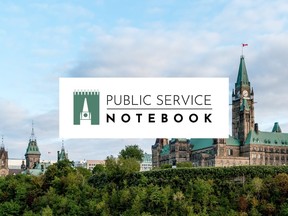Here are five public-service updates you need to know.

Article content
Happy National Public Service Week? From a rally on telework to calls from federal unions to boycott employer-led activities during the annual weeklong event, here are five public-service updates you need to know.
-
- Bureaucrats took home more than $400 million in bonuses last year
- Unions urge members to boycott National Public Service Week events
- Rally held at TBS building as unions ask government to “scrap” the telework mandate
- StatsCan report finds that teleworkers have better work-life balance
- PSAC members vote to raise strike pay, demand the government impose an arms embargo on Israel
Advertisement 2
Story continues below
Article content

1. Bureaucrats took home more than $400 million in bonuses last year, Taxpayers Federation says

Employees working for federal departments, agencies and Crown corporations took home $406,422,221 in bonuses in 2023-24, according to documents obtained by the Canadian Taxpayers Federation.
Bureaucrats working in federal departments and agencies received $210,784,269 in bonuses, up from $202 million in 2022-23. Staff working at Crown corporations received $195,637,952 in bonuses.
“Bonuses are for when you do a good job. They shouldn’t be handed out like participation ribbons,” the organization’s federal director, Franco Terrazzano, said in a news release highlighting that about 90 per cent of federal executives received bonuses each year despite low rates of targets being met. “Taxpayers can’t afford to bankroll big bonus cheques each and every year for highly-paid government executives.”
The Crown corporations that issued the most bonuses included the Business Development Bank of Canada, which gave out $59,105,600 in bonuses, and Export Development Canada, which gave out $35,632,112. The federal departments issuing the most included the Department of Justice, which gave out $18,969,929 in bonuses, and Canada Revenue Agency, which gave out $18,076,704.
Advertisement 3
Story continues below
Article content

2. Unions urge members to boycott National Public Service Week events

Taking place annually during the third week of June, National Public Service Week is intended to recognize the value of federal employees’ services and acknowledge their contribution to the federal administration, according to the Government of Canada website.
Amid a fury over the return-to-office issue, however, federal unions are asking their members to boycott employer-led events, including the Professional Institute of the Public Service of Canada, the Canadian Association of Professional Employees (CAPE), the Association of Canadian Financial Officers and the Union of Taxation Employees, among others.
“While the employer tries to win us over with trivial gestures this week, we all know the truth,” PIPSC said in a news release, noting that members were grappling with ongoing Phoenix pay system issues, “nonsensical” return-to-office mandates, bad bargaining practices and “rampant” outsourcing. “We demand genuine respect, fair working conditions, and a trustworthy employer, not a hot dog lunch or a pat on the back.”
Treasury Board of Canada Secretariat spokesperson Joie Huynh said every federal organization celebrates the week “as it sees fit.” She said none of the planned activities at TBS had been cancelled.
In a release, CAPE asked its members to support the boycott by informing managers they would not participate in government-organized events, but would instead participate in union activities.

3. Rally held at TBS building as unions ask government to “scrap” the telework mandate

The Union of Safety and Justice Employees (USJE), alongside members of the Public Service Alliance of Canada and other unions, gathered in front of the Treasury Board building in downtown Ottawa on Tuesday to demand that the government “scrap” its mandate requiring public servants work on-site three days a week by mid-September.
A small group gathered outside the Elgin Street building during lunch hour, holding signs with messages like “Who does Anita listen to?” And “Remote control is for TVs.”
Advertisement 4
Story continues below
Article content
“Public service employees have fully adapted to a modern, decentralized work format which promotes productivity, limits unnecessary commuting time and leverages basic technological innovations,” USJE president David Neufeld said in a news release. “The new Treasury Board Directive is a significant step backwards, not forward.”

4. StatsCan report finds that teleworkers have better work-life balance

As federal public servants prepare to spend more time working on site, a survey released by Statistics Canada last week revealed that employees working from home were happier with their work-life balance than those working on-site.
Released on June 5, the study was part of the 2022 Time Use Survey, which received 12,336 responses.
It looked at how telework was linked to time use and well-being by comparing three groups of workers: non-teleworkers; teleworkers working on-site on “diary day,” when respondents had to report activities done over 24 hours; and teleworkers working at home on diary day.
“Because this was drawn from a nationally representative sample, those who are employed as federal public servants would likely be included,” said Dana Wray, the study’s main author and senior analyst at Statistics Canada.
Advertisement 5
Story continues below
Article content
The survey found that teleworkers saved more than an hour a day by not commuting, had more time for housework and care for children and had more time to sleep and eat. Despite having more time for these activities, the survey found that paid work time did not differ between the employees.
In a statement Treasury Board spokesperson Martin Potvin said the government was aware of the data, recognized the benefit of hybrid work and heard the preferences of employees to maintain some flexibility.
“We also believe in the value of human interaction in the workplace at many levels, including during onboarding of new public servants,” Potvin said, noting that the decision was made by the TBS secretary and chief human resources officer following consultations with, and the endorsement of, deputy ministers from across government, including the clerk and deputy clerks of the Privy Council. “Moving from two to three days to a minimum of three days, as well as an increase of senior management presence to (four) days, strikes an appropriate balance of maximizing the benefit of presence in the workplace while maintaining flexibility.”
Advertisement 6
Story continues below
Article content

5. PSAC members vote to raise strike pay, demand the government impose an arms embargo on Israel

During PSAC’s last convention, which took place in May, members voted to pass several resolutions, including a demand that the Canadian government impose an arms embargo on the government of Israel. The resolution also outlined that PSAC would support South Africa’s genocide case at the International Court of Justice and would conduct member education on “the history of Israel’s occupation and colonization of Palestine, Canada’s complicity and labour’s role to support a just peace.”
Members also voted for a resolution to lobby the government to speed up bargaining through the Public Interest Commission process and a resolution for PSAC to develop actions against any changes to the government’s hybrid policy and for bargaining units to prioritize telework in the next round of bargaining. The resolution did not outline the cost of any potential telework campaign.
At the convention, a resolution also passed to raise daily strike pay to $100 from $75.
J.P. Surette, regional vice-president for the National Capital Region for the Union of Safety and Justice Employees, said strike pay hadn’t been increased in at least 23 years.
While it was a contentious issue, as raising pay means raising union dues, Surette said increasing the move for members was necessary as they “need to know that they’re going to be taken care of.”
Recommended from Editorial
Article content


Comments